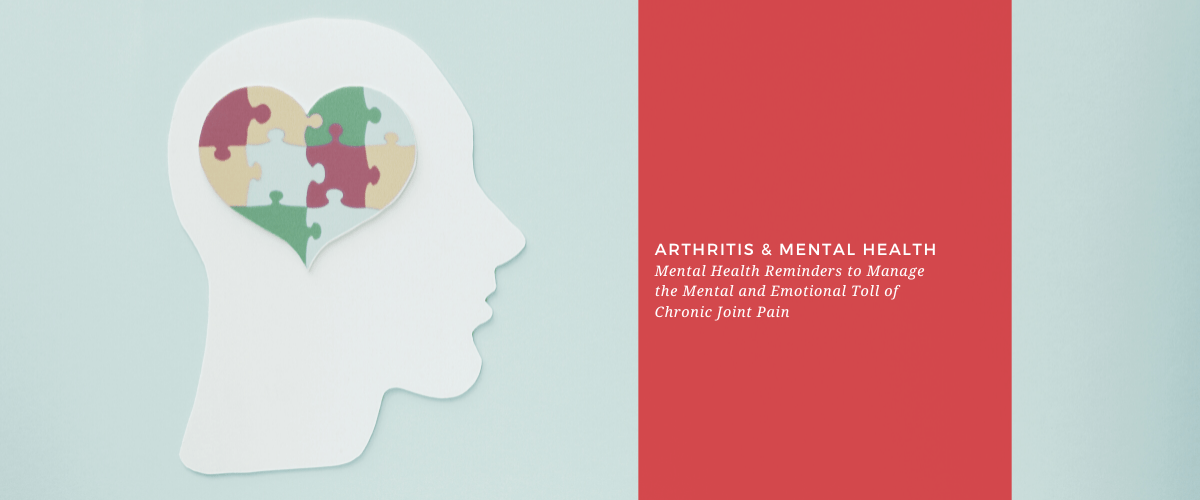With over 1 million orders

Mental Health Reminders To Help Manage the Mental and Emotional Toll of Chronic Pain
Arthritis, on good days, can be a nuisance. But on bad days, it can be unbearable.
It’s no surprise therefore that living with arthritis, depression, anxiety, insomnia and whole lot of other symptoms can become a vicious cycle that can take a heavy mental and emotional toll, not just on yourself, but on the people around you.

When you find yourself unable to do the things that you love, are slowly losing your independence, are unable to keep up and have fun with friends and family, it’s easy to succumb to depression. And because you feel like no one else understands your pain, you settle into this pattern of isolation and dejection.
Taking care of your emotional health is just as critical as your physical well-being when it comes to managing arthritis. So thought we’d share a few mental health reminders that will help you manage your mood better.
Mental Health Reminders To Keep In Mind
I have to be more conscious of how my body body reacts to pain and depression
Fact is, pain and depression go hand in hand—and both tend to feed off each other. People who are in pain are more susceptible to depression and mood swings. And on the flipside, people who suffer from depression amplify their experience of physical pain simply because they have poor emotional health.
Making yourself aware of this fact makes it easier for you to stay grounded and give yourself perspective. There are numerous things you can do to manage both your pain and your mental health.
There are tools and techniques that can help me reduce stress and anxiety
There will be times when the pain and dealing with the lifestyle changes associated with arthritis will feel intensely overwhelming. When that happens, stop and try these three stress-busting techniques:
- Take 15 minutes out and give yourself some quiet time. Focus on something that you like—listen to music, read something, take a nap—anything that can shift focus from the pain.
- Pause and breathe. Breathe in and out slowly and allow your body to relax with each breath.
- Move—even if you’re only able to in the most limited way. It doesn’t have to be big movements or a full exercise regiment. It can be a small, simple stretch, or getting up from where you are. The movement will help your mind feel better and give you this sense of accomplishment.
Most of the time, people are simply waiting for you to reach out--they are more than willing to listen.
We like to remind arthritis sufferers that they are not alone and having arthritis is nothing be embarrassed about. The pain you feel and the symptoms associated with the disease is no joke. Managing the condition requires bravery and resilience, and talking to someone about it can only help.
You’re basically dealing with a condition that has debilitating physical effects and long term emotional and mental impact. That’s a lot to handle alone. Reach out to friends and family or find a support group who share similar experiences.
There is nothing wrong with asking asking for help.
Asking for help, no matter what situation, is not a sign of weakness.
When it comes to arthritis, keep in mind that treating and managing the condition will require a comprehensive treatment plan that includes all aspects of your health and well-being.
It can be as simple as using compressive tools and aids to improve your mobility, being prescribed new medication, or incorporating a new exercise routine or meditation sequences into your daily routine. Whatever it is, these will help manage the pain and maintain your independence, or asking your doctor for help in managing the mental and emotional toll chronic pain is taking on you.
Bear in mind that everyone is different too, which means there’s no one-size-fits-all approach to managing the emotional and mental effects that this disease has. Know however, that both are just as important when it comes to managing the disease. And in the course of treating it, can include behavioral therapy, stress management techniques, medication, or even alternative medicine.
Keep These Mental Health Reminders In Mind
Never put off getting help.
There will be days when you will feel helpless, overwhelmed, and beaten. On these days, your emotional and mental well-being will suffer. Don’t ignore it. Treating every aspect of your health is part of the road to wellness.
At Dr. Arthritis, we understand the very real connection between physical pain and the emotional challenges that arthritis presents. We are here to support you every step of the way.
